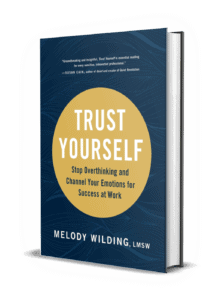What stands in your way of being taken more seriously at work? If you’re like many of the coaching clients I work with, then your first answer may be “myself.”
Whether you’re trying to advance to get a raise or promotion or become more visible and build gravitas, you need to talk about yourself at work. And imposter syndrome is often the number one barrier that keeps top performers from putting themselves out there and reaching their full potential.
Imposter Syndrome and Self-Promotion in The Workplace
Imposter syndrome leads you to doubt yourself and downplay your capabilities. You believe you’re not smart enough (despite your many accomplishments) and assume it’s only a matter of time before others discover that you’re a fraud.
Imposter syndrome is more common among Sensitive Strivers—high-achievers who are also highly sensitive. Because they think and feel everything more deeply, Sensitive Strivers are prone to overthinking and emotional reactivity that can result from imposter syndrome. So instead of talking about themselves, these leaders tend to be quieter and reserved (pausing before acting, taking time to observe, etc) and to put other people’s needs ahead of their own.
If this sounds like you, then it’s time to stop:
- Fearing visibility in the workplace
- Diminishing the value you bring to the table
- Dismissing your impact
- Minimizing the importance of your thoughts and opinions
- “Putting your head down” and expecting to be noticed
In other words, it’s time to overcome imposter syndrome and own your strengths and successes. It’s time to use your voice and embrace the art of authentic self-promotion by talking about yourself at work.
Because the truth is, being a Sensitive Striver is a tremendous strength. Your traits are correlated with high-performing behaviors like conscientiousness, loyalty, and empathy. In fact, managers rate sensitive employees as their top contributors.
If you want to change the beliefs you have about yourself (i.e., I’m not good enough, smart enough, etc), then you need to take a different action. Specifically, you need to take action that is aligned with the belief you want to create for yourself.
That’s why self-promotion matters. It helps you create a new identity as someone who does have a lot to offer.
I understand if the idea of talking about yourself and your accomplishments makes you want to gag. After all, there are many distasteful examples of self-promotion that give the concept a bad name.
But consider this:
- If you want other people to regard and respect you as someone capable, you have to conduct yourself as such.
- By keeping your skills, capabilities, and achievements to yourself, you deprive others of the chance to receive help from you.
- When do you speak up for yourself, you set an example and create a safe space for others to do the same.
Plus, there are ways you can promote your work that feels more organic and authentic to you as a Sensitive Striver.
Free GUIDE
7 Strategies to Speak Up With Confidence
Don’t sit through another meeting paralyzed by fear. Get the guide leaders at Google and Facebook use to voice their opinions with confidence.
Unsubscribe at any time. Your details are protected in accordance with my Privacy Policy.
5 Ways to Be More Confident and Talk About Yourself at Work
1️. Share stories
Sensitive Strivers often shy away from talking about their work because it feels too me, me, me focused. But the best “brags” are those that also offer value to the other person. One easy way to do this is through storytelling.
For example, I had a client who was trying to feel more confident and build internal credibility at her company. In meetings, she started sharing anecdotes about how she navigated tough client issues. By sharing lessons learned and helpful tips, she quickly became seen as someone who had leadership ability and got results.
2️. Express pride and gratitude
Ditch phrases like “Oh, it was nothing”, “no big deal”, “well I did X, but I didn’t do Y”. Quit throwing yourself under the bus. Accept praise gracefully (“Thanks! I’m glad you noticed. I worked hard on that project.”).
Be more forthcoming about expressing your genuine emotions about your accomplishments, specifically your pride and gratitude. That can sound like – “I’m really proud of how the plan came together!” or “I’m grateful for the great opportunity to expand my business and work with more clients.”
3️. Embrace updates
Your boss should be your biggest advocate, and the only way they can do that is if you’re constantly giving them a pulse on what you’re doing. On Monday send a quick note to your boss outlining where you plan to focus for the week and one Friday report back on your progress, being specific to share key wins and positive feedback you’ve received. Alternatively, add an “Accomplishments” section to your one-on-one meeting agenda.
You can take this a step further with a monthly or quarterly team update that is circulated throughout the organization or to senior leadership. Think of this like a newsletter that has the primary goal of keeping everyone informed, but secondarily helps you share results you and your team are getting.
4️. Pull-in proof
Be vocal about the stamps of approval you get from others. This leverages social proof and may involve sharing positive feedback you received about your work or a testimonial you got from a client. It could also include mentioning reputable partners your company works with, or well-known organizations you’re a member of or affiliated with.
Also, quantify and specify wherever possible. Hard numbers and details are compelling. There’s a big difference between, “I’m a technology manager” versus “I’m a technology manager with 10 years of experience leading teams in the US and Asia.”
5. Volunteer your expertise
One of the best ways to communicate your value is by teaching what you know to others. Offer to host a lunch-and-learn or “brown bag session” on a subject you’re passionate about, for example. Be the one who raises their hand to get involved in new projects that will give you exposure to other parts of the organization and utilize your skill set.
Take on mentoring opportunities to train new employees at your company or younger people in your industry. Not only does it feel great to give you back, by teaching others, you realize how truly knowledgeable you are.
Free GUIDE
7 Strategies to Speak Up With Confidence
Don’t sit through another meeting paralyzed by fear. Get the guide leaders at Google and Facebook use to voice their opinions with confidence.
Unsubscribe at any time. Your details are protected in accordance with my Privacy Policy.









